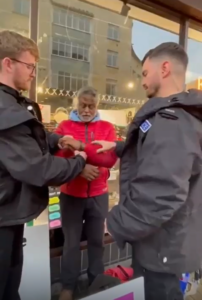- “Thanks be to God” – Glasgow priest celebrates as blanket ban overturned
- Scotland’s top court declares government’s three-month ban on church services unlawful
EDINBURGH (24 March 2021) – The Scottish government’s treatment of churches during the pandemic has been unlawful – so ruled Lord Braid in a judgment handed down today from Scotland’s top civil court. A coalition of 27 faith leaders, alongside Glasgow priest Canon Tom White, had challenged the proportionality of the ban in a legal challenge that was heard on March 11th-12th. The ruling could prevent similar blanket bans on public worship from being imposed in the future by Holyrood.
“I’m overjoyed to hear that the court has understood the essential need to protect not only the physical and material health of our society but also its spiritual needs and therefore overturned the disproportionate, unnecessary and unlawful blanket ban on public worship. This decision highlights the significance of the church’s role in society. Now, we can trust that our fragile and damaged communities will never again be left without the church as a source of hope, comfort, and vital spiritual nourishment in times of crisis. I’m grateful to all across Scotland and beyond who have offered their financial support for my case, and who have faithfully prayed with me for church doors to be reopened. Thanks be to God for this wonderful news!” said Canon White, upon learning of the decision.
The government announced a major concession the night before the judgment, stating in parliament that churches would reopen with a cap of 50 worshippers this Friday.
Human rights experts at ADF UK had supported Canon Tom’s case with the Let Us Worship campaign.
“An extraordinary abuse of the state’s power”
The court noted that churches had been treated unfairly in comparison to other public places, which had been allowed to open throughout the latest lockdown. Even cinemas have been opened for the purposes of Sheriff Court jury trials.
Lord Braid also rejected the government’s argument that believers could simply worship online. The Catholic Church, for one, considers sacraments, which must take place in person, to be essential.
“While some people may derive some benefit from being able to observe on-line services, it is undeniable that certain aspects of certain faiths simply cannot take place, at all, under the current legislative regime,” read the decision issued by Lord Braid.
“It is impossible to measure the effect of those restrictions on those who hold religious beliefs. It goes beyond mere loss of companionship and an inability to attend a lunch club,” he continued.
The government “have admittedly paid lip service to article 9 by referring to it, but there is no evidence that they have accorded it the importance which such a fundamental right deserves.”
“For all these reasons, I have concluded that the Regulations do constitute a disproportionate interference with the article 9 right of the petitioners and others,” concluded the Court.
Arguments were submitted to the Court on the behalf of the Glasgow priest by Aidan O’Neill QC, one of Scotland’s leading human rights advocates, who called the ban “an extraordinary abuse of the state’s power”.
“[The blanket ban] has a fundamental chilling impact on worship and belief. It requires people in good conscience to choose between God and Caesar,” said Aidan O’Neill QC.
Right to freedom of worship upheld
The parish priest of St Alphonsus Church in the Calton area of Glasgow had cited his “grieving” parish as his inspiration for carrying the legal challenge forward, despite facing a sizeable financial burden. Canon White takes a position of pastoral leadership over some of the most economically-deprived communities in the UK. He has appealed to the public to support his legal challenge via Justgiving, where he has so far raised approximately 35% of his goal. Efforts to cover the costs of the challenge remain ongoing.
Human rights experts from ADF UK, which supported the case, have welcomed the court’s decision.
“We celebrate this decision with Canon Tom White, because the court has recognised that which the government did not – that freedom of religion and belief is a human right to be afforded the highest protection. In declaring the ban to be “unlawful”, the court helps ensure that people of faith will not again have their rights erased in this way. We congratulate the Canon and the other faith leaders involved for having the courage to take this necessary challenge forward, and securing protection for churches across Scotland for the future,” said Ryan Christopher, Director of ADF UK.


